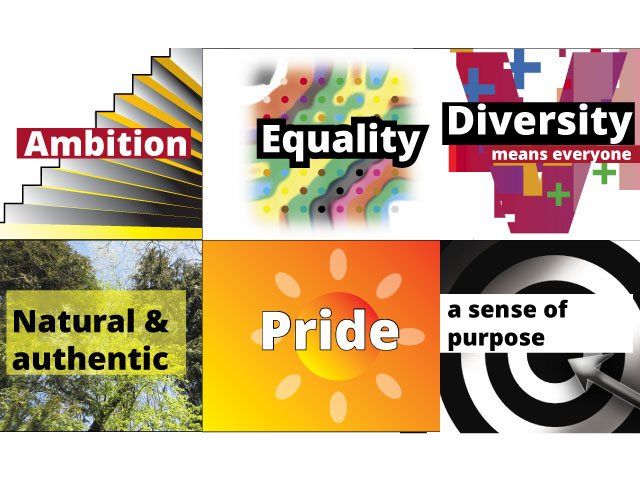Autism Focus
Value is...
Positive Sense Examples
Highlighting examples on a positive sense of value for a person with Autism
Scroll down the page to view some examples
The elements featured on this page including:
Inclusion, equality, pride, sense of purpose and sharing good practice
This project element has transferred to the project Valuing Autism

Inclusion
In a demanding and a perceptive culture, an independent autistic person at a moderate level can face many challenges and obstacles when attempted to be to be an inclusive member of society.
Many people with autism are very self-aware and do make many attempts to be considerate and to be adjustable. Unfortunately, their place in society can be out-shadowed by the negative stigma, caused by a certain minority who has caused negative reputations. We must not use any stigma or typecasts to exclude or to marginalise an autistic person.
However, through smarter understanding (not only with their differences but to understanding their intentions, strengths and what makes them thrive), an autistic person can be a positive benefit as an inclusive member of society.
Tips:
* See an autistic person beyond in perceptions or assumptions.
* To understand how their difficulties affect them along with their strengths and specialities of their experiences and expertise.
* Take time to understand their self-awareness and consideration efforts.
* Be aware of adjustments may need to make to maintain their stability and to not let their difficulties cause harm to their circumstances.
* However, do not over scrutinised on how their differences affecting them
Equality
Any form of labels, typecasts and assumptions can hinder an autistic person to be an equal member of society in areas such as employment, education and a participant in the local communities. It is so important to see beyond the autistic label or any perceptions and assumptions you may have.
Take time to fully understand not only their differences but also their strengths. Get to know their sense of purpose and how they are approaching to achieve it. Explore with them any potential obstacles and challenges which may arise and involve them involve with then develop realistic solutions and strategies.
Always see the best out of an autistic person but not with any unrealistic expectations, demands or standards.
Pride
A person with autism can face many challenges which can affect their self-worth due to perceptions & one especially when society can the medical aspects along with type casts and stereotypes.
Sadly. other factors cause harmful stigma caused by a small minority of individuals. All these and other factors can cause unnecessary shame to law-abiding people with the autistic spectrum who is self-aware and attempts to be very considerate and to make responsible adjustments. Every person within the autistic spectrum is not the same related to their difficulties or strengths. We need to look autism beyond type casts medical aspects and stereotypes. There is a person inside every autistic person as we need to embrace the positives and understand how they can be a benefit to everyone.
Summary
* Pay more attention to how self-aware they are and what they have to do to maintain their stability and to expand their life forward.
* Show more interest on their Passions and their efforts to be considerate to others.
* Pay more attention to the effort to be considerate and during be considerate how they can be underminded or be wrongly challenged due to their differences.
* Show more appreciation and make him feel they're proud to be with you.
* Never dismiss or to belittle their experiences, insight or feelings.
* Refrain from using their differences to attack a character or integrity.
Ambitions
There are many strengths in skills, abilities and expertise from an autistic person.
The can be unfortunately be misinterpreted their ambitions as having obsessions.
They can achieve many things but their efforts can be unfairly unnoticed and be focused too much on their perceived differences in their passions. We must avoid making specific attitudes such as challenging them with cynical questioning or to use their differences attack the character and integrity. To make sure an autistic person can achieve many things they need to be more supported & encouraged.
Autistic individuals strengths & passions can help make a difference. This should be considered for specific opportunities such as specific employment occupations and as a participant in communities.
Tips:
* Show greater supportive interest on their ambitions
* Be aware of their obstacles & challenging of their ambitions. Don't use this to make backhanded remarks and instead supportive to find ways to eliminate or to reduce the obstacles.
Sharing Good Practice
There are many positive achievers with autism from all walks of life. These people are the most important influences to enable a good sense of value. Not politicians, consultants or any experts in the medical professionals can every replace real ground level experiences. An important ingredient to enable positive achievers and role models with autism.
They can make a difference than anyone can imagine. The more people with autism with achievers & role models then you have a reduction of any stigma.
The main points for people with autism:
So if you are an achiever living with autism it is important for you to share good practice with your expertise on your experiences and circumstances. This could be related to any situation or issue which you go through. You could be a community leader and employee and an achiever in education or anything which has made a positive difference in your community.
Explore more
The entire "Value is" project have a total of 13 different elements with more detailed information including background perspectives, the main points along with tips across all invisible difficulties
Visit the "Value is" main project page

Supporting
Autism Awareness Week (UK)
World Autism Awareness Day
World Autism Awareness Month
Autistic Pride Day
Autism Acceptance Day & Month

